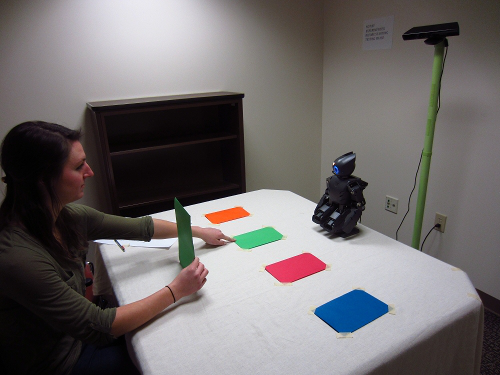Implicit Learning for Human-Robot Interaction
 Robots are envisioned to become a ubiquitous technology in the future, and will be found in a variety of settings. People will expect to be able to customize both the appearance and behavior of their robots to best suit their preferences. Learning from demonstration (LfD) is a promising way for members of the general public to create new behaviors for their robot since it is an intuitive way for teaching and does not require the teacher to have specialized skills.
Robots are envisioned to become a ubiquitous technology in the future, and will be found in a variety of settings. People will expect to be able to customize both the appearance and behavior of their robots to best suit their preferences. Learning from demonstration (LfD) is a promising way for members of the general public to create new behaviors for their robot since it is an intuitive way for teaching and does not require the teacher to have specialized skills.
However, as with all forms of technology, robots will not learn correctly all of the time, and this will cause users to become frustrated. This frustration will manifest itself in a variety of ways depending on unique attributes of the users. These user attributes include personality, technology experience, cultural background, preconceived notions of robots, mental and physical capabilities, etc.
We are designing new methods for robots to automatically sense user frustration and modify their behavior to mitigate problems in real-time. The overall goal of this research is to help inform the design and programming of adaptable robots that can be customized to suit individual preferences.
Selected Publications:
Hayes, C.J. and Riek, L.D. "Establishing Human Personality Metrics for Adaptable Robots During Learning Tasks". In Proceedings of the AAAI Fall Symposium on Artificial Intelligence in Human-Robot Interaction (AI-HRI), 2014.
Hayes, C., Crowell, C., and Riek, L.D. (2013). "Automatic Processing of Irrelevant Co-Speech Gestures with Human but not Robot Actors". In Proceedings of the 8th ACM/IEEE International Conference on Human-Robot Interaction (HRI). [Acceptance Rate: 24%] [pdf]
Riek, L.D. (2013). "The Social Co-Robotics Problem Space: Six Key Challenges". In Proceedings of Robotics: Science, and Systems (RSS), Robotics Challenges and Visions. [pdf]
